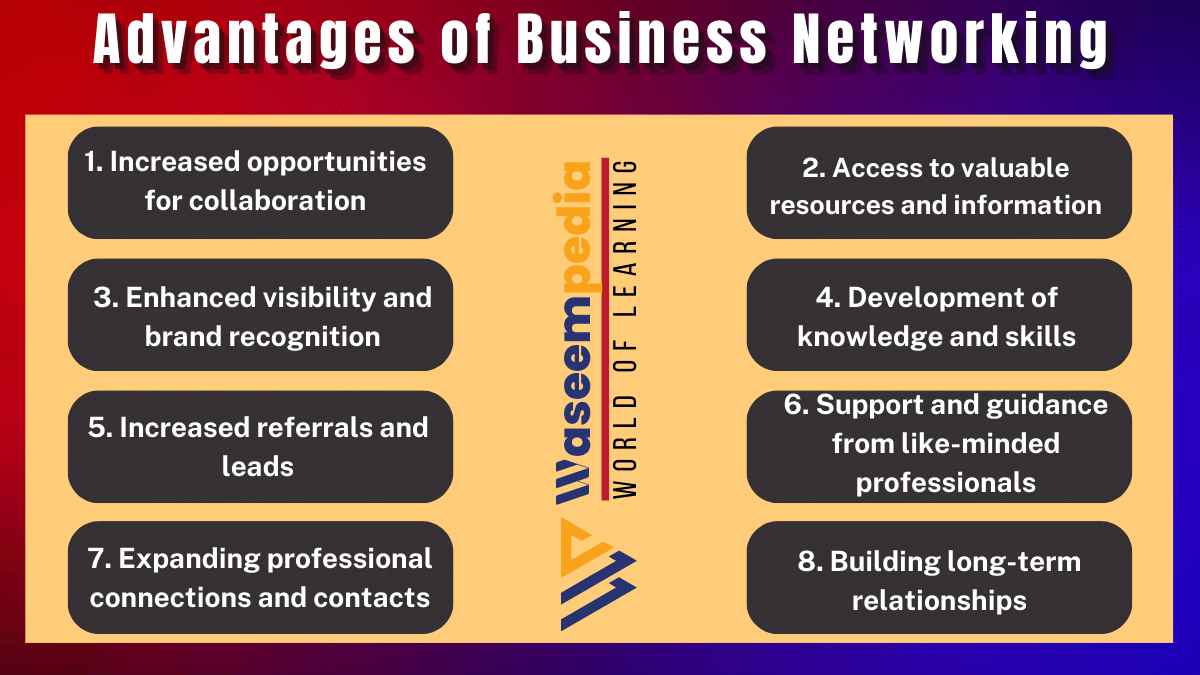Business networking having advantages that can contribute to the growth and success of professionals and organizations. From increased collaboration and access to resources to enhanced visibility, credibility, and support, networking provides a platform for fostering meaningful relationships and unlocking new opportunities. By actively engaging in networking activities and cultivating strong connections, professionals can position themselves and their businesses for long-term success.
In today’s highly interconnected business landscape, networking has become a crucial aspect of success. Building and nurturing relationships with other professionals and businesses can bring numerous advantages and opportunities for growth. This article explores the advantages of business networking and highlights the strategic considerations that can lead to successful networking.

Business networking is an essential activity for professionals and organizations looking to thrive in today’s competitive market. By actively engaging with other professionals, sharing knowledge and resources, and building strong relationships, business networking offers a range of advantages that can propel growth and success.
10 Advantages of Business Networking
There are many Advantages of Business Networking but 10 Advantages of Business Networking are as following.
1. Increased opportunities for collaboration
One of the primary benefits of business networking is the increased potential for collaboration. By connecting with professionals from complementary industries or those with similar goals, businesses can explore collaboration opportunities that can lead to innovative projects, joint ventures, or shared resources. Collaboration allows businesses to leverage each other’s strengths and create mutually beneficial partnerships.
2. Access to valuable resources and information
Networking provides access to valuable resources and information that can significantly benefit a business. Through interactions with industry peers and experts, professionals can gain insights into industry trends, best practices, and emerging opportunities. This information can help businesses make informed decisions, stay ahead of the competition, and adapt to the changing market dynamics.
3. Enhanced visibility and brand recognition
Active participation in business networking events and platforms can enhance a company’s visibility and brand recognition. By consistently engaging with a wide range of professionals, businesses increase their exposure and establish themselves as reputable and knowledgeable entities in their respective industries. This increased visibility can lead to new business opportunities, referrals, and partnerships.
4. Development of knowledge and skills
Networking allows professionals to expand their knowledge and develop new skills. By engaging in conversations, attending seminars or workshops, and participating in industry events, individuals can learn from the experiences and expertise of others. This continuous learning and skill development contribute to professional growth and increase the value that individuals bring to their organizations.
5. Increased referrals and leads
Business networking provides a fertile ground for generating referrals and leads. When professionals build trust and establish strong relationships with their network, they become more likely to receive recommendations and referrals from their contacts. These referrals can lead to new clients, customers, or business opportunities, expanding the reach and potential of a business.
6. Support and guidance from like-minded professionals
Networking offers a valuable support system where professionals can seek guidance, advice, and support from like-minded individuals. Sharing challenges, discussing strategies, and seeking input from trusted peers can provide fresh perspectives and solutions to problems. This support system can be invaluable, especially for entrepreneurs or individuals in leadership positions.
7. Expanding professional connections and contacts
Business networking expands professional connections and contacts. By actively participating in networking events, joining industry associations, or utilizing online networking platforms, professionals can broaden their network and connect with individuals they may not have otherwise met. These connections can open doors to new opportunities, partnerships, and collaborations.
8. Building long-term relationships
Effective business networking focuses on building long-term relationships rather than short-term gains. By nurturing relationships based on trust, respect, and mutual benefit, professionals can establish a network of reliable contacts. These relationships can provide support, guidance, and opportunities for years to come.
9. Increased confidence and credibility
Active engagement in business networking can boost confidence and credibility. By consistently showcasing expertise, sharing valuable insights, and actively contributing to discussions and conversations, professionals enhance their reputation as knowledgeable and trustworthy individuals. This increased confidence and credibility can positively impact career advancement and business growth.
10. Improved business reputation
Business networking can significantly improve the reputation of a business. Through positive interactions, referrals, and word-of-mouth recommendations, a company can build a strong reputation within its industry. A reputable business is more likely to attract clients, customers, and partners, further fueling growth and success.
Related FAQ’s
What are three benefits of networking with other businesses?
Three benefits of networking with other businesses are as given below:
Increased opportunities for collaboration and partnerships.
Access to valuable industry insights and knowledge.
Expansion of your customer base through referrals and recommendations.
What are the uses of business network?
The uses of a business network are as following
Building professional relationships.
Sharing information and resources.
Generating leads and referrals.
Seeking advice and mentorship.
Collaborating on projects and opportunities.
What is the most important factor in business networking?
The most important factor in business networking is building genuine and mutually beneficial relationships.
What is business networking examples?
Examples of business networking are as following:
Attending industry conferences and trade shows.
Joining business associations and chambers of commerce.
Participating in online forums and social media groups.
Hosting or attending networking events and mixers.
Connecting with professionals on LinkedIn and other platforms.
What are the methods of networking in business?
Methods of networking in business are as given below:
Attending networking events.
Joining industry-specific associations.
Utilizing social media for professional connections.
Building relationships through referrals.
Collaborating on projects or partnerships.

